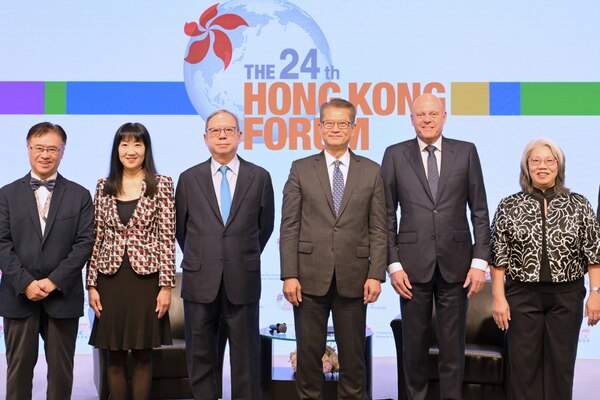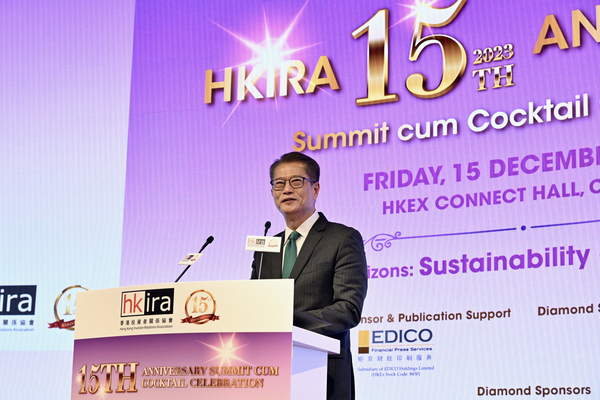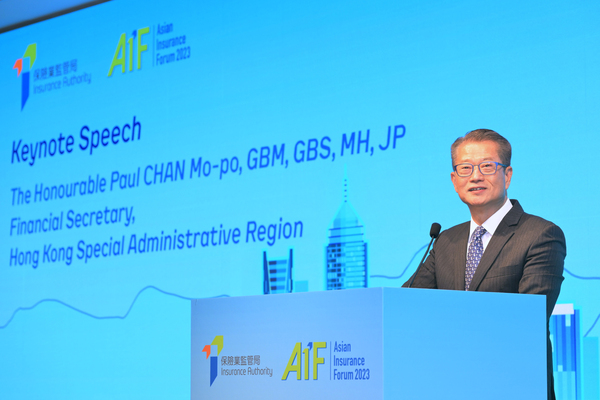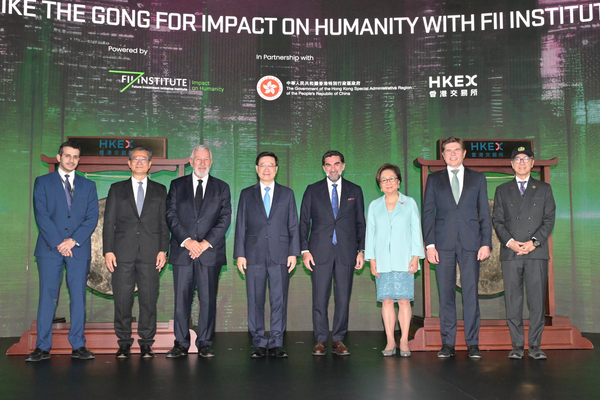
Over these two days, I am confident that you all have gained valuable insights into the evolving business landscape of Hong Kong and the boundless array of opportunities that lie ahead. I am sure the enlightening exchange of ideas will also inspire fresh perspectives for collaboration and more businesses.
Hong Kong is bouncing back
For those of you who are coming from afar, for joining this event, and for your pursuit of business or leisure here in Hong Kong or in the Greater Bay Area, I am sure you can see for yourselves what Hong Kong is truly like.
American singer and designer Pharrell Williams, who is the Creative Director of Louis Vuitton, staged a dramatic runway show under the lights of Victoria Harbour just last week. In his words to CNN, Hong Kong is just like having “a very serious energic flow …You are going to see it across business and all the different sectors, from fashion all the way to finance”.
And beyond fully displaying ourselves as Asia’s fashion capital, last week, the first ever Saudi Arabia ETF (exchange-traded fund) was listed on the Hong Kong Stock Exchange. This week – indeed tomorrow and on Friday – we are hosting the first ever Priority Summit in Asia organised by the Saudi Arabia-based FII Institute. The event is gathering prominent political and business leaders from the Middle East and Asia. Together, these events signify that Hong Kong is a multilevel bridge for connecting not only capital and investors between the two regions, but also thought leadership.
Indeed, Hong Kong’s connectivity with the outside world is also returning: our airport, which connected more than 220 destinations with 1,100 flights a day before the pandemic, will recover to about 80% capacity by year’s end, and full recovery next year. Tourist numbers are also gradually coming back, with number of visitors having reached three to four million per month in the past few months.
So Hong Kong is shining again, against what some Western media agencies have tried to portray us over the past two years.
Firm commitment to “one country, two systems”
And let me assure you that Hong Kong will continue to be firmly committed to implementing the “one country, two systems” principle in the long run. This is a solemn commitment by President Xi Jinping, the Communist Party of China as well as the country.
That means that the many institutional advantages of Hong Kong under “one country, two systems”, eg the common law system and the rule of law, free movement of information, data, capital and people, a friendly business environment that aligns with the best international practices, a low and simple tax regime, and all the advantages that have made Hong Kong unique and appealing, will be here with us for the long run.
Hong Kong’s economic landscape
Now, allow me to update you on Hong Kong’s economy. This year, 2023, we are faced with a challenging global environment filled with complexities and tensions. Interest rates have heightened and will remain higher for longer, and the global growth is expected to further slow down – from 3% this year to 2.9% next year. All these will impact on Hong Kong as a small, open, and externally oriented economy.
Our GDP (gross domestic product) growth is forecast to be 3.2%. And the drivers remain to be exports, investment and private consumption. For the first three quarters, exports of goods from Hong Kong fell by 14% mainly due to weakened demand for exports from the Mainland under a challenging external environment, as well as geopolitical tensions and its resultant disruptions to supply chain. On the contrary, exports of services, in particular tourism, rapidly expanded by 21% in the same period. Our overall capital investment also showed improvement with 8.2% compared with last year, and private consumption had also risen by close to 9%.
And inflation is moderate, at just 2%, thanks to the contained price pressures on a number of major components like rental and basic food. The impact of energy cost escalation on us is modest because we are a service economy. Unemployment rate is also low, at 2.9%. And in fact, our current problem is not with unemployment but insufficient talent and labourers.
For the asset market, the property market had gone through some ups and downs this year. Residential property prices went up for the first four months, and then came down. At the last count, which is end-October, it was around 4% lower than last year-end. But it has been an orderly adjustment with moderate price adjustment and low volume of transactions. There has not been any panic in the market nor stress in our financial system.
Meanwhile, our stock market is also bumpy. But there has been no untoward volatility. Our financial markets are closely connected with the economic and financial situation of the Mainland as well as the international perception about economic prospects of the country.
Recently, top decision-makers from the People’s Bank of China and the Mainland’s financial regulator, including the CSRC (China Securities Regulatory Commission), attended the Global Financial Leaders Investment Summit and the HKMA-BIS High Level Conference. They provided compelling accounts of the Chinese economy: that it is undergoing some adjustments and transformation, but they were conducive to the long-term and sustainable development of the country. The prospects of the Chinese economy remain promising: it is highly resilient, supported by a huge consumer market, strong innovation ability, a deep pool of talent and well-established infrastructure and industrial chains. The central government also has ample policy room to stimulate economic growth. And China continues to be committed to high-level two-way opening up in its pursuit of high-quality development.
Opportunities ahead
It is clear that in the short term, Hong Kong will face some headwinds in light of the global geo-economic fragmentation.
But just as the saying goes, “Wherever there is danger, there lurks opportunity.” We see the remarkable strengths Hong Kong possesses, and are determined to build on them to capture the immense opportunities ahead.
Hong Kong, under this new-term Government, has been taking a very proactive and catalytic role in driving our economy.
Above all, we have the staunch support and backing of our country. On being proactive, if I can share two examples: one is to attract strategic enterprises coming to Hong Kong. Since last December to the end of October, the Office for Attracting Strategic Enterprises had made contacts and meetings with more than 200 companies. About 30 of them have settled or decided to settle in Hong Kong, with an initial investment of around HK$30 billion and creation of 10,000 jobs. Most of these are research and development or middle and senior management jobs.
On talent attraction, we launched the Top Talent Pass Scheme and modified some admission schemes for different types of professionals. Altogether, since the end of last December to the end of October, we had got over 180,000 applications. We approved 110,000 of them and over 70,000 people had arrived in Hong Kong.
Under the National 14th Five-year Plan by the central government, Hong Kong has been given eight directions for future development: the international centres in shipping, trade, finance, aviation, and innovation and technology; and also the regional centres for intellectual property trading and legal services and dispute resolution; and finally an East-meets-West centre for international cultural exchange.
In the Policy Address announced by the Chief Executive last year, we are pressing full steam ahead along these eight directions. But in the interest of time, if you may allow me to elaborate the two in particular: financial services and innovation and technology. I believe for the short to medium-term, these two areas will be our most important engines for growth.
Financial services
Financial services are our core strength. But we need to continue to enhance ourselves, to remain competitive and to stay ahead of the competition.
For example, our stock market is bumpy this year. We have set up a task force looking into the ways and means to improve the liquidity of our stock market. They have given us recommendations which will be implemented. Some of them include deepening the connect arrangements with the Mainland so that we can attract not just international capital but Mainland capital. To supplement, we will be making tremendous efforts to attract more international companies to come to Hong Kong for listing. Because when these companies come, they will be able to tap into not just international capital but also Mainland capital. With an improved liquidity, the valuation of these companies will be better supported.
Apart from the stock market, we are devoting our energy to developing bond market, the green and sustainable finance sector. We are leading the green finance centre in Asia. The green bond issued by us accounts for one-third of the entire Asia’s share. We are not just talking about the volume; we are proactively taking the leadership in terms of standard-setting, including converging Mainland green standards with international green standards; providing certification services to ensure no green-washing; and building capacity training the required talent.
We also see tremendous opportunities in renminbi internationalisation and Hong Kong’s role as an offshore renminbi hub. At the moment, in terms of trade settlement and reserve currency, the global share of renminbi is just over 3%. But China’s imports and exports account for over 14% of the global trade. There is much room for growth. Currently, renminbi-denominated products and risk-management tools are comparatively limited offshore. If we can develop more products and introduce more risk-management tools, it will enable more foreign businesses to use renminbi in settlement and investment.
For asset and wealth management, we have an asset under management of more than HK$30 trillion. About two-thirds of them are coming from outside Hong Kong. The Greater Bay Area, with a young and affluent population, presents tremendous opportunities in this respect.
Innovation and technology
For innovation and technology, we have chosen four areas for development. They include artificial intelligence and big data analytics; health science and biotech, fintech; and advanced manufacturing and new energy and new materials.
In order to jump-start our development in this area, we have been investing heavily. Over the past few years, we have invested over HK$20 billion, and the ecosystem is becoming more vibrant. But we need to do it faster because what we need is not just an ecosystem; we need companies, so that we can create a cluster of such companies to build the value chain that would also help us attract the required talent. I mentioned the initiatives of attracting strategic enterprises. We even set up the Hong Kong Investment Corporation, and put HK$62 billion into this company with a view to help attract these enterprises to settle in Hong Kong: if they want us to take a minority share to show our commitment, we will be happy to consider.
We are improving the facilities in the Science Park and Cyberport, and we will also be investing tremendously along the boundary with Shenzhen to develop the San Tin Technopole and the Lok Ma Chau Loop. These two areas would be the places to host tech companies to be attracted. In a nutshell, if you look at the geography of Hong Kong, the south – Hong Kong Island, Tsim Sha Tsui, etc – will be dedicated to financial services; and in the north neighbouring Shenzhen, the focus will be technology and innovation. These will be the two major engines for our future economic growth.
Ladies and gentlemen, in order to realise this ambition, we know that we need to create capacity. For labour, various labour importation schemes are being implemented. These labourers will come starting from the beginning of next year. We also need to create more land and housing. In the coming few years, our investment in infrastructure will be massive.
Ladies and gentlemen, I am conscious of the fact that I have been speaking for too long. But before I close and proceed to take your questions, may I also remark on one strength of Hong Kong that should not be underestimated – our position as an art and cultural centre, a cosmopolitan city for people to enjoy their lives, a place for exchange between East and West, and for this I think perhaps a short video will be much better than words to summarise. If I may show that in the short video, please.
Financial Secretary Paul Chan gave these remarks at the 24th Hong Kong Forum Keynote Luncheon on December 6.
via Moroccan Trader Govt proactively driving economy



